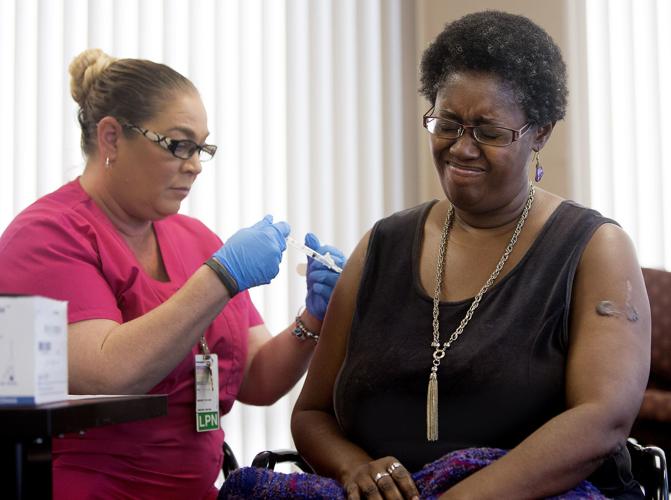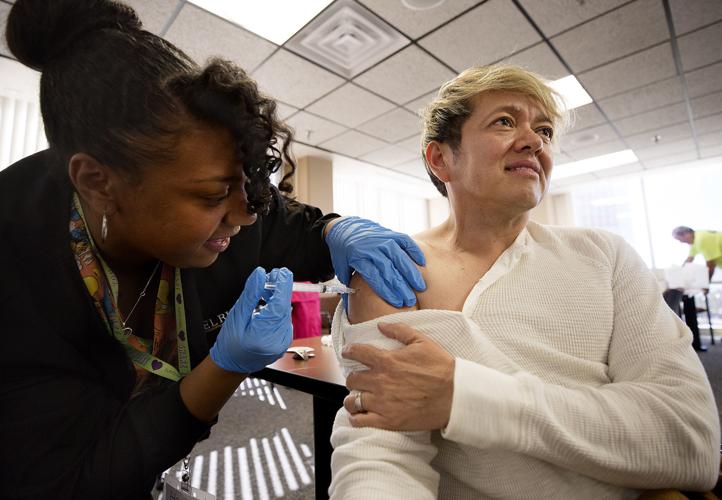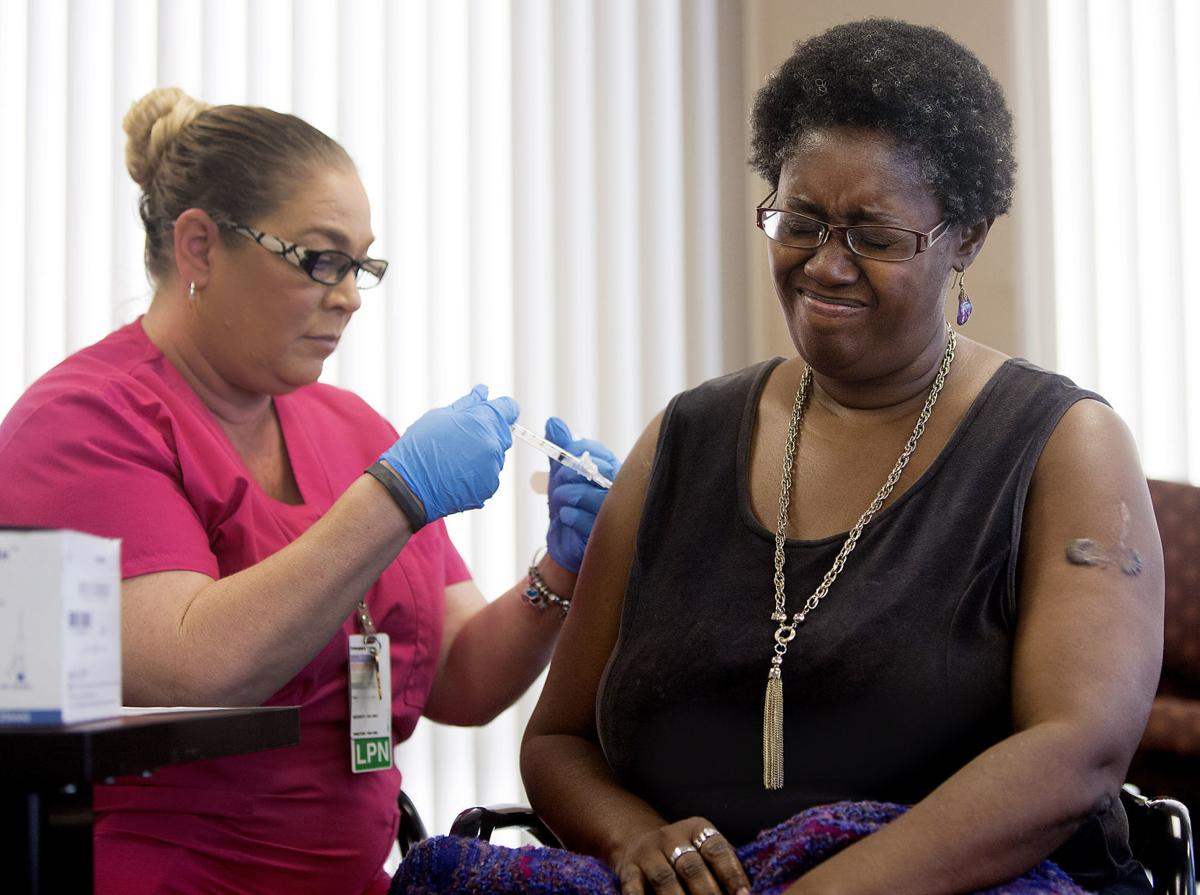Fifty-six cases of laboratory-confirmed cases of the flu have been reported to the Arizona Department of Health Services in the first two weeks of the state’s flu season, far surpassing the five-year average of 16 cases during that time period, officials say.
The current number of confirmed cases also outpaces the 39 that were reported for the same period last year, a particularly bad season for the state. In fact, the 2017-2018 flu season was harsh, starting early and spreading quickly, said Paula Mandel, deputy director of the Pima County Health Department.
“By number, we had more flu cases reported to the (Arizona) health department than during the pandemic year,” said ADHS Director Cara Christ, referring to the 2009-2010 swine flu outbreak.
Over 35,000 cases of lab-confirmed flu were reported in Arizona last flu season.
“We know that at the health department, we’re just getting the tip of the iceberg,” Christ said, because not all people sick with the flu go to the doctor and not every single case is lab-tested for confirmation.
Statewide, 1,178 people died from influenza and pneumonia in the 2017-18 flu season, much higher than the 400 to 700 average.
Five of the deaths in Arizona were children, including a child in Pima County, where over 4,400 flu cases were reported last season.
Nationally, over 80,000 people died last flu season, according to the CDC. Over 180 children died and 80 percent of them were unvaccinated.
Last flu season, only 57.9 percent of Americans were vaccinated against the flu, down from 59 percent the year before.
Pima County and the U.S. Centers for Disease Control and Prevention recommend everyone 6-months-old and older get vaccinated before the end of October.
And in spite of the rising number of illnesses this season, state and local health officials say they still must overcome misconceptions about the virus and vaccine. Here’s what you need to know.
It’s almost year-round
“Influenza is much worse than a cold,” said the state’s Christ. “Flu will cause fever, respiratory symptoms, severe muscle aches, fatigue. You feel like you were hit by a truck and have a higher likelihood of secondary infections, especially pneumonia.”
Flu season is almost year-round now, the county’s Mandel said. Although, she added, that might be partly because testing and reporting has gotten better. In the past, those with flu in the summer might have been diagnosed with something else.
“It’s never too early or too late to get the vaccine,” she added. “It’s the best protection we have.”
The virus is especially hard on people with preexisting respiratory issues, such as asthma and COPD. It can lead to pneumonia, which can also lead to infection and death. The elderly are especially vulnerable during flu season, Christ said.
High fever can also cause severe dehydration. “It can push someone with chronic conditions over the edge. It happens whether they’re young or old,” said Dr. Kumar Dharmarajan, chief science officer of Clover Health, a Medicare Advantage insurer.
“Some people’s immune systems go into overdrive, and they go into septic shock. That’s how kids tend to die,” said Natalie Olendorf,a family nurse practitioner at TMCOne.
Doing things like sleeping well, managing stress and eating nutritiously will keep your immune system strong, said David Salafsky, University of Arizona director of health promotion and preventive services.
Still not, everyone will get the vaccine.
Only 69 percent of Tucson seniors — one of the most vulnerable populations to the virus — will get vaccinated, according to the monthly Flu Shot Monitor survey of 300 Tucson seniors over 60 conducted by Clover Health.
This rate is higher than the national average of 63 percent — but still “concerning,” as Clover Health officials put it.
Moreover, Arizona is ranked No. 47 in the country for flu vaccination rates of those over 65, according to the 2018 America’s Health Rankings Senior Report.
West Virginia ranks no. 1 at 67.5 percent, and Wisconsin comes in last at 49.5 percent. The U.S. average is 58.8 percent, according to this study.

Lin Baldazo, right, receives a flu shot from Lakiya Canty, associate manager from El Rio Health Center on October 18, 2018.
Common misconceptions
Many people harboring misconceptions about the vaccine “don’t have the full picture for why getting it is important,” Mandel said.
The most common argument health officials hear is that people think it will make them sick or that they’ll fall ill even if they’re vaccinated.
After you get vaccinated, it takes two weeks for your body to train itself to ward off the virus.
If you are exposed to flu germs right before or right after you’re vaccinated, you’ll still get sick. The CDC recommends you get the vaccine before the season starts, in early fall.
There’s also the possibility that people will come down with a cold or bronchitis and confuse that for the flu, Olendorf said.
Also, the flu shot does not contain a living virus, so it can’t infect your body, according to health officials. The nasal spray contains a weakened virus that also won’t make you sick.
However, in rare cases, people show side effects that they confuse for the flu, Olendorf said.
Vaccines aren’t perfect. For example, last year’s vaccine was 40 percent effective, according to the CDC.
“The tricky part with influenza is it’s really hard to predict (the best vaccine formulation) because the virus circulates, mutates and shifts, so you really never know what flu season is going to look like and how well the vaccine will work,” Christ said.
But even if the vaccine is not a perfect match, it can shorten the duration of the flu, lessen your symptoms and make you less contagious.
While healthy young people are less at risk, and often object to the shot, they can still get sick and even die, Olendorf stressed.
People also don’t realize how contagious the flu is, Christ said.
Avoid spreading germs by washing your hands frequently, avoiding touching your face and sneeze into a tissue or into your elbow. If you do get sick, stay home if you can.
Others worry about egg allergies, but according to the American Academy of Allergy, Asthma and Immunology, so little egg protein is used that it’s unlikely to cause a reaction. Still, people should talk to their doctor about what’s best, as not all formulations contain eggs.
“We know the flu can be a killer and that it’s preventable,” Dharmarajan said.
Protecting everyone
When more people get vaccinated, the less severe the season will typically be, Oldendorf said. “Social responsibility would be to get vaccination to protect loved ones and co-workers.”
As an example, Mandel noted that “by vaccinating everybody around an infant (who can’t yet receive the vaccination), you’re also protecting that infant. We hope people are mindful that it’s protecting others in the community.”
Those infected can still expose others for up to two days before showing any symptoms.
Margo Chavez, 54, paralegal with the public defenders office, received her vaccination on Oct. 18 when El Rio Community Health Center set up a flu shot clinic in her building.
She said she gets one every year because she has grandkids, she interacts with the public frequently in her work and she wants to manage potential health issues.
Her husband, on the other hand, doesn’t always get his shot, she said.
“‘I’m a big man, I don’t need it,’” she teased as she lowered her voice: “He’ll get one this year,” she said.
El Rio said that in the last three weeks, it has administered 1,800 flu shots at similar clinics and will continue through early November.
“Last year, we did 1,600 in the whole month of October, so we’re already beyond that,” said Stephanie Gorton, executive assistant at El Rio.
Clinics that bring the flu shots to businesses are advertised by word of mouth, she said. Businesses ask El Rio to provide vaccinations to their employees.
But Gorton added, “If anyone else happens to stumble upon one of these clinics, we won’t turn them away.”






